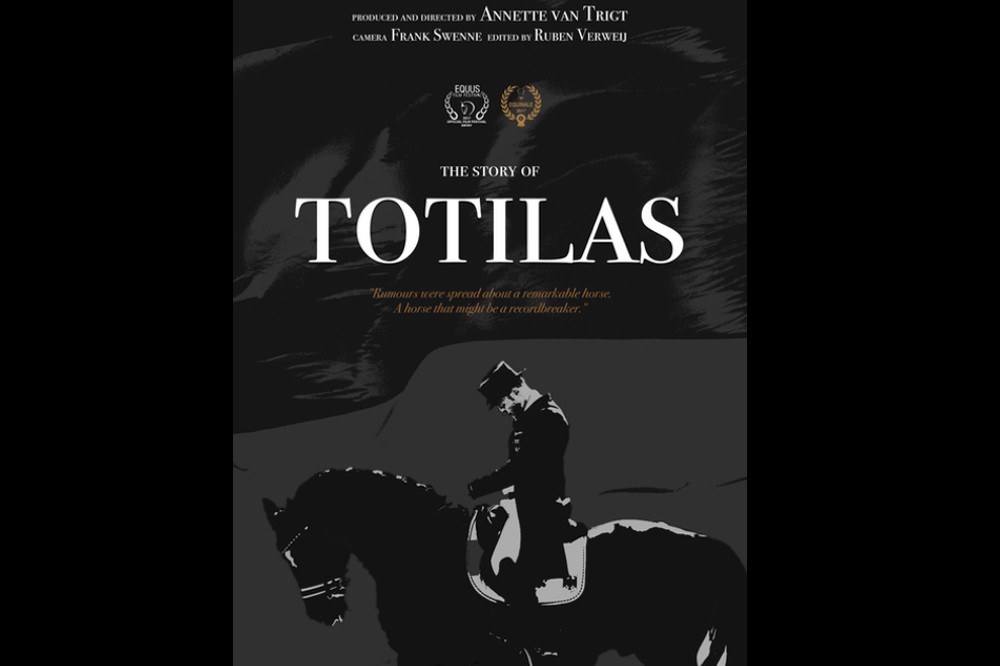The Story of Totilas: When Emotion and Business Get Too Close

What I noticed most while watching the Totilas’ namesake documentary by Dutch journalist, Annette van Trigt, was how emotional all of “his people” got. Seasoned riders, experienced trainers, and jaded owners would choke up, trail off wistfully or struggle for words during their interviews. Edward Gal, the rider with whom the black stallion stunned audiences, is seen with his face twisted in agony at the sight of Totilas in the warm-up under Mathias Rath.
Presented at the Equus Film Festival in Headwaters, Ontario, the film explores all of these passions and sentiments, that are mixed in with millions of dollars exchanging hands. “A horse is worth 800 euros. That’s what it fetches at the knackers. The rest is all emotion,” said Sjeff Janssen, who coached Totilas and Rath. This quote puts in perspective the immense monetary value and pressure that is placed on horses who run fast, jump high over sticks, and dance pretty.
As someone who has not had a large amount of experience with multi-million dollar horses (ahem), I never fathomed the hot-potato feeling of owning a superstar equine athlete. Expensive inanimate objects, like artwork or cars, can at least be stored in an air-controlled, bubble-wrapped environment. Seeing $10 million dollars strutting around outside in the elements, stepping on his own legs and tripping, would definitely give me heart palpitations. Until Totilas landed in his apparently forever-home with the Rath family, there was a distinct air of anxiety with his owners. They seemed afraid of having to hold a flame like him.
The sale after the 2010 FEI World Equestrian Games, and subsequent fall from grace of Totilas, was shrouded in mystery, rumor, illness and injury. Expected to (ahem) perform stud duties on a regular schedule in order to recoup some of his astronomical sale price while in full training for competition, the wear and tear was evident on his mental and physical health. Fans were in an uproar when their favorite dancing horse was snatched from the limelight and all but disappeared. Owners property magnate Kees Visser and his wife Tosca, were even sent death threats after they sold Totilas to Paul Schockemöhle.
Reading in between the lines of the film, one scene in particular stood out to me: Rath approached Totilas at the barn, offering up an apple. The horse grabbed the apple and retreated to the back of his stall, choosing to leave his rider standing alone in the aisle without even a grateful slobber-kiss. Each and every horse is different in terms of social niceties, but Totilas seemed to be almost cranky and aloof. Given the social sensitivity of equines, it’s not a far-fetched idea. Was he angry at being taken away from Gal and the environment he knew? Perhaps.
Where do we draw the line between “horse” and “business investment”? Compassion and love for the animal is what keeps them safe, happy and performing well. But money is what fuels this expensive sport. The people financially capable of owning such horses got to where they are by making tough decisions, and at the end of the day it is their money. Sentimentality causes exceptions to this rule, such as Dutch dressage rider, Anky Van Grunsven, who was highlighted in the film for the fact that she owned her much-decorated gelding, Bonfire, until the day he died at the ripe old age of 30, and then buried him on her farm.
Anky obviously missed out on some serious cash by hanging onto her horses until they were well past their prime (Salinero is now retired and still under her care). However, there is a certain purity and honor of seeing a lifelong partnership between horse and rider, which was evident in her successful partnerships. The question that has been asked many times over is, “what would have happened if Totilas could have stayed with Edward Gal?” Perhaps an exciting duel between them and a certain British “Girl with the Dancing Horse.”
Totilas, now retired, remains a lesson in the delicate nature of athletic success. Like it or not, horses are living, breathing creatures who are not motivated by shiny medals or trophies. Passing them around like objects is going to affect their mental health and physical performance. Whether the competitive demise of Totilas was an unfortunate string of coincidences (which horse people can easily relate to) or a mismanaged transition, the film is a fascinating behind-the-scenes look at this unlikely tale.

